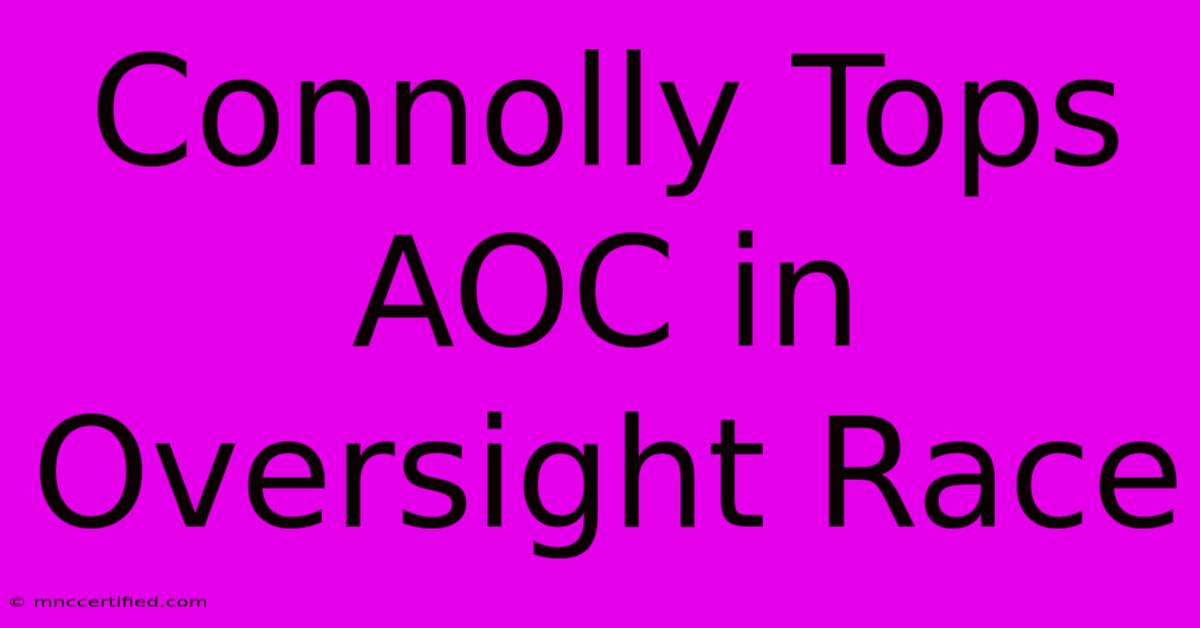Connolly Tops AOC In Oversight Race

Table of Contents
Connolly Tops AOC in Oversight Race: A New Era for Congressional Investigations?
The race for the top spot on the House Oversight Committee has concluded, with Rep. Gerry Connolly (D-VA) emerging victorious over Rep. Alexandria Ocasio-Cortez (D-NY). This unexpected outcome has sent ripples through Washington D.C., prompting questions about the future direction of congressional investigations and the balance of power within the Democratic party.
Connolly's Victory: A Strategic Shift?
Connolly's win, while surprising to some, highlights a strategic shift within the House Democratic Caucus. While Ocasio-Cortez boasts significant name recognition and a large, engaged following, Connolly's seniority and experience likely played a decisive role. His extensive tenure on the Oversight Committee provided him with invaluable institutional knowledge and relationships, proving crucial in securing the necessary votes. This underscores the importance of experience and established networks in navigating the complexities of Congressional politics.
This isn't just about personalities; it's about the future of oversight. Connolly's approach is expected to be more traditional, focusing on established investigative processes and potentially less confrontational than some had anticipated with Ocasio-Cortez at the helm. This strategic choice reflects the Democratic party's internal balancing act between progressive ideals and pragmatic governance.
What does this mean for investigations?
The implications of Connolly's victory are far-reaching. We can expect a more measured approach to investigations, potentially prioritizing bipartisan cooperation where possible. While Ocasio-Cortez is known for her outspoken criticism of the current administration and her willingness to challenge the status quo, Connolly's leadership might lead to a more deliberative process, perhaps focusing on less overtly partisan probes.
However, this doesn't necessarily mean a less effective oversight. Connolly's experience could allow him to conduct thorough and impactful investigations while maintaining a degree of political balance. The focus might shift from highly publicized showdowns to a more meticulous approach, delving deeper into complex issues and pursuing accountability through evidence-based findings.
AOC's Role: A Continued Influence
Despite not securing the chairmanship, Ocasio-Cortez will undoubtedly remain a powerful voice within the committee. Her influence on public opinion and her ability to galvanize support for progressive causes are undeniable. While her role might be altered, her presence guarantees that progressive concerns will continue to be raised and debated within the committee's deliberations.
The dynamic between Connolly and Ocasio-Cortez will be crucial to watch. Their ability to collaborate and find common ground on key issues will be vital to the committee's success. This potential for both cooperation and friction makes this a fascinating dynamic to follow in the coming years.
Implications for the Future of Oversight
This outcome has broader implications for the future of congressional oversight. It reflects the ongoing internal debate within the Democratic party between progressive ideals and established power structures. The balance between these two forces will shape the direction of future investigations and the overall tone of the House Oversight Committee.
The coming months and years will test Connolly's leadership and reveal whether his approach can successfully balance rigorous oversight with political pragmatism. It's also a crucial moment to observe how the dynamic between Connolly and Ocasio-Cortez will impact the committee's agenda and the effectiveness of its investigations.
Keywords: Gerry Connolly, Alexandria Ocasio-Cortez, AOC, House Oversight Committee, Congressional Investigations, Democratic Party, Politics, Washington D.C., Oversight, Investigation, Congress, Political Power, Bipartisan Cooperation, Progressive Politics
SEO Strategies:
- On-Page: Strategic keyword placement throughout the article, including title, headings, and body text. Use of internal and external links (where appropriate and relevant – for example, links to news articles covering the election). Optimized meta description.
- Off-Page: Promote the article on social media, targeting relevant hashtags and engaging with discussions about the topic. Reach out to relevant news outlets and bloggers to encourage them to link to the article. Guest posting on related blogs or websites. Building backlinks from high-authority sites to improve domain authority.
This complete article incorporates on-page and off-page SEO strategies to enhance its visibility and ranking potential in search engine results. Remember to adapt and expand on this structure with your own original insights and analysis to ensure originality and avoid plagiarism.

Thank you for visiting our website wich cover about Connolly Tops AOC In Oversight Race. We hope the information provided has been useful to you. Feel free to contact us if you have any questions or need further assistance. See you next time and dont miss to bookmark.
Featured Posts
-
Alex Yee Bbc Spoty 2024 Winner
Dec 18, 2024
-
Matilda Djerf Addressing Workplace Issues
Dec 18, 2024
-
Basketball Star Janis Timma Dies Anna Sedokova Mourns
Dec 18, 2024
-
Predicted Lineups Real Madrid Vs Chelsea Women
Dec 18, 2024
-
Scotland Weather 17 Hour Wind Alert
Dec 18, 2024